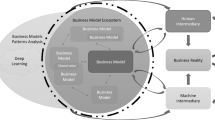Abstract
At the present stage, successful cities are experiencing a digital transformation. Information and communication technologies (ICT) contribute to the enhanced competitiveness, improving the quality of life, establishing the interaction between citizens, business and government. These issues are considered through the concept of “Smart City”. The demand for intelligent technologies “Smart City” is gradually taking shape in Russia. In this part, Russia is significantly inferior to leading economies, and the projects being implemented are mainly related to point digitalization. Single-industry cities are in great demand for “smart” solutions. Problems of single-industry cities are considered as one of the main priorities of national policy. For decades, single-industry cities have been the basis of Russian economy and, at the same time, the most vulnerable elements of the socio-economic space. In economy digitalization, single-industry cities do not need measures to overcome the temporary decline in production. They strongly need a new development model. The main goal of this model should be to enhance the efficiency of the economic mechanism based on the introduction of digital technologies and platform solutions into the economy and management of the city. Taking into account the features of socio-economic development and the existing needs, the company has the opportunity to choose the appropriate model. We believe that the model of a single-industry city should be based on a comprehensive assessment of its competitiveness. The purpose of the contribution is to determine the specific nature of assessing the competitiveness of single-industry cities under digital transformation of the economy and to develop guidelines based on the results of theoretical and empirical data. The authors of the contribution attempted to select the optimal scenario for digital transformation of the single-industry city depending on the model of its development.
Access this chapter
Tax calculation will be finalised at checkout
Purchases are for personal use only
Similar content being viewed by others
References
Akpinar M, Can Ö, Mermercioglu M (2017) Assessing the sources of the competitiveness of the US states. Compet Rev 27(2):161–178. https://doi.org/10.1108/CR-02-2016-0014
Annoni P, Dijkstra L (2013) EU regional the competitiveness index: RCI 2013. Publications Office of the EU, Luxembourg
Annoni P, Dijkstra L (2017) Measuring and monitoring regional the competitiveness in the European union. In: Huggins Robert (ed) Handbook of regions and the competitiveness: contemporary theories and perspectives on economic development. Edward Elgar Publishing, Massachusetts
Bogomolova IV, Mashentsova LS, Sazonov SP (2014) Sustainable development of large cities from the standpoint of assessing the competitiveness of the territory [Ustoychivoye razvitiye krupnykh gorodov s pozitsii otsenki konkurentosposobnosti territorii]. Basic Res 9(11) 6:2506–2510
Bruneckiene J, Cincikaite R, Kilijoniene A (2012) The specifics of measurement the urban the competitiveness at the national and international level. [Miestų konkurencingumo vertinimo nacionaliniu ir tarptautiniu mastu ypatumai]. Eng Econ 23(3):256–270. https://doi.org/10.5755/j01.ee.23.3.1272
Center for Strategic Research (2013) Single-industrial cities: reboot. Search for new models of the functioning of single-industry cities of Russia in the changed economic conditions. http://www.ladoga-park.ru/content/2014/04/140426152728/140426152728140426152938.pdf/ Accessed 25 Mai 2018
Center for Strategic Research (2018) Smart city in Russia. How to make the cities to mind? https://www.csr.ru/wp-content/uploads/2018/06/Report-Smart-Cities-WEB.pdf/. Accessed 21 Mai 2018
Du Q, Wang Y, Ren F, Zhao Z, Liu H, Wu C, Shen Y (2014) Measuring and analysis of urban the competitiveness of Chinese provincial capitals in 2010 under the constraints of major function-oriented zoning utilizing spatial analysis. Sustainability (Switzerland) 6(6):3374–3399. https://doi.org/10.3390/su6063374
Grinchil BM, Korosteleva NE (2003) The most important factors for increasing the the competitiveness of regions [Vazhneyshiye faktory povysheniya konkurentosposobnosti regionov]. Eurograd, St. Petersburg
Hu R, Blakely EJ, Zhou Y (2013) Benchmarking the competitiveness of Australian global cities: Sydney and Melbourne in the global context. Urban Policy Res 31(4):435–452 https://doi.org/10.1080/08111146.2013.832667
Hu R (2015) Sustainability and the competitiveness in Australian cities. Sustainability (Switzerland) 7(2):1840–1860. https://doi.org/10.3390/su7021840
Kwon S, Kim J, Oh D (2012) Measurement of Urban The competitiveness based on innovation indicators in six metropolitan cities in Korea. World Technopolis Rev 1(3):177–185. https://doi.org/10.7165/wtr2012.1.3.177
Monfaredzadeh T, Berardi U (2014) How can cities lead the way towards a sustainable, competitive and smart future? WIT Trans Ecol Environ 191:1063–1074. https://doi.org/10.2495/SC140902
Ni P, Wang Y (2017) Urban sustainable the competitiveness: a comparative analysis of 500 cities around the world. In: Huggins Robert (ed) Handbook of regions and the competitiveness: contemporary theories and perspectives on economic development. Edward Elgar Publishing, Massachusetts
Prokop V, Stejskal J (2015) Impacts of local planning to the competitiveness index change – using approximate initial analysis of the Czech regions. WSEAS Trans Bus Econ 12:279–288
Rastvortseva SN, Manaeva EV (2016) The development of methodological support for the assessment and forecasting of the socio-economic state of a monocity [Razvitiye metodicheskogo obespecheniye otsenki i prognozirovaniya sotsial’no-ekonomicheskogo sostoyaniya monogoroda]. Econ-Inform, Moscow
Sáez L, Periáñez I (2017) Measuring urban the competitiveness in Europe. Handbook of regions and the competitiveness: contemporary theories and perspectives on economic development. Edward Elgar Publishing, Massachusetts, pp 463–491. https://doi.org/10.4337/9781783475018
Sáez L, Periáñez I, Heras-Saizarbitoria I (2017) Measuring urban the competitiveness: Ranking european large urban zones. J Place Manag Dev 10(5):479–496. https://doi.org/10.1108/JPMD-07-2017-0066
Ukrainskiy VN (2018) Regional the competitiveness: methodological reflections [Regional’naya Ukrainskiy konkurentosposobnost’: metodologicheskiye refleksii]. Quest Econ 6:117–132
Wang L, Shen J (2017) Comparative analysis of urban the competitiveness in the yangtze river delta and pearl river delta regions of China, 2000–2010. Appl Spat Anal Policy 10(3):401–419. https://doi.org/10.4337/9781783475018
Zhang W, Deng F, Liang X (2015) Comprehensive evaluation of urban the competitiveness in Chengdu based on factor analysis. In: Ninth international conference on management science and engineering management, pp 1433–1440. https://doi.org/10.1007/978-3-662-47241-5_119
Author information
Authors and Affiliations
Corresponding author
Editor information
Editors and Affiliations
Rights and permissions
Copyright information
© 2020 Springer Nature Switzerland AG
About this paper
Cite this paper
Guseva, M.S., Dmitrieva, E.O. (2020). The Competitiveness of Single-Industry Cities in the Digital Transformation of the Economy. In: Ashmarina, S., Mesquita, A., Vochozka, M. (eds) Digital Transformation of the Economy: Challenges, Trends and New Opportunities. Advances in Intelligent Systems and Computing, vol 908. Springer, Cham. https://doi.org/10.1007/978-3-030-11367-4_20
Download citation
DOI: https://doi.org/10.1007/978-3-030-11367-4_20
Published:
Publisher Name: Springer, Cham
Print ISBN: 978-3-030-11366-7
Online ISBN: 978-3-030-11367-4
eBook Packages: Intelligent Technologies and RoboticsIntelligent Technologies and Robotics (R0)



